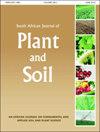南非东开普省以玉米为基础的保护性农业系统下的土壤碳固存和二氧化碳通量
IF 0.7
Q3 AGRONOMY
引用次数: 1
摘要
传统的耕作方法会消耗土壤中的碳,并导致二氧化碳(CO2)的排放。我们在2012-2015年的五个种植季节调查了保护性农业原则对南非东开普省两个农业生态区的碳固存和二氧化碳通量的影响。实地试验采用分块-分块设计。主要的处理方法是耕作制度,如传统耕作或免耕。亚处理为轮作模式:玉米-休耕-玉米(MFM);玉米-休耕-大豆(MFS);玉米-小麦-玉米(MWM);或玉米-小麦-大豆(MWS)。每种轮作作物后的残留物管理是残留物去除(R-)或残留物保留(R+)。轮作的生物量和碳输入均为:MWM>MWS>MFM>MFS。R+导致的颗粒有机物(POM)水平高于R-。前者是两年后两个地点0–5 cm深度层土壤有机碳(SOC)显著增加的唯一因素(p<0.05)。常规耕作的CO2通量比免耕高出20%。CO2通量受气温(p<0.001,r2=0.41)和土壤容重(p<001,r2=0.16)的显著影响。本文章由计算机程序翻译,如有差异,请以英文原文为准。
Soil C sequestration and CO2 fluxes under maize-based Conservation Agriculture systems in the Eastern Cape, South Africa
Traditional farming methods deplete soil carbon and contribute to carbon dioxide (CO2) emissions. We investigated the effects of Conservation Agriculture principles on C sequestration and CO2 flux from two agroecological regions in the Eastern Cape province, South Africa, over five cropping seasons in the period 2012–2015. The field trials were laid in a split–split plot design. The main treatments were the tillage system, as conventional tillage or no-till. The sub-treatments were the crop rotation pattern: maize–fallow–maize (MFM); maize–fallow–soybean (MFS); maize– wheat–maize (MWM); or maize–wheat–soybean (MWS). Residue management after each crop in rotation was residue removal (R–) or residue retention (R+). The biomass and C-inputs by the crop rotations were both in the order: MWM > MWS > MFM > MFS. R+ resulted in greater levels of particulate organic matter (POM) than R–. The former was the only factor to significantly (p < 0.05) increase soil organic carbon (SOC) in the 0–5 cm depth layer at both sites after two years. CO2 flux under conventional tillage was 20% higher than with no-till. The CO2 fluxes were significantly influenced by air temperature (p < 0.001, r 2 = 0.41) and soil bulk density (p < 0.001, r 2 = 0.16). The results suggest that MWM or MWS crop rotation in conjunction with R+ under no-till offer the greatest potential for biomass and C-inputs, and consequently C sequestration, in sub-humid and semi-arid agroecological regions of South Africa.
求助全文
通过发布文献求助,成功后即可免费获取论文全文。
去求助
来源期刊

South African Journal of Plant and Soil
Agricultural and Biological Sciences-Plant Science
CiteScore
1.90
自引率
11.10%
发文量
32
期刊介绍:
The Journal has a proud history of publishing quality papers in the fields of applied plant and soil sciences and has, since its inception, recorded a vast body of scientific information with particular reference to South Africa.
 求助内容:
求助内容: 应助结果提醒方式:
应助结果提醒方式:


